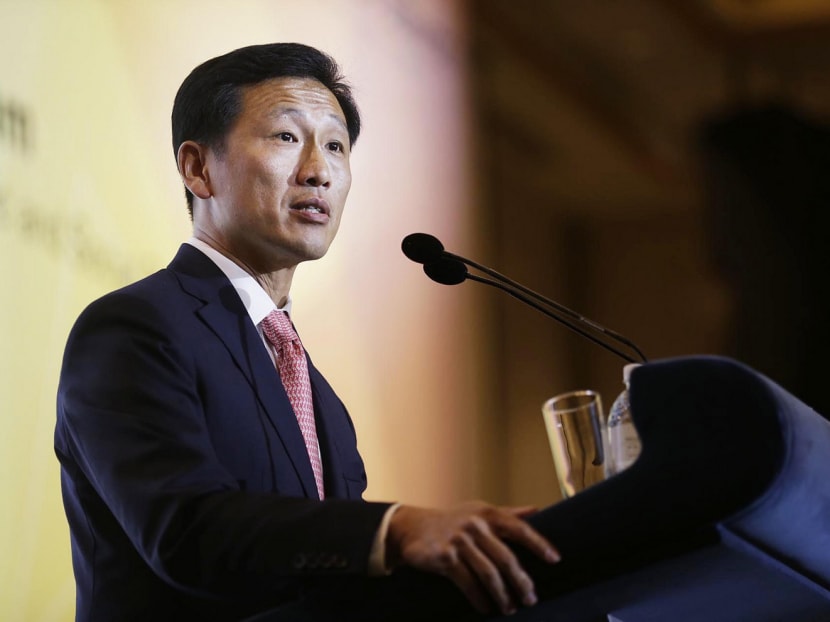Think big, start small, act fast, civil servants told
SINGAPORE — Stressing the need for strong trust between political leaders and the Civil Service, Education Minister (Higher Education and Skills) Ong Ye Kung yesterday called on civil servants to offer bold policy suggestions, rather than “second-guess the policy preferences” of ministers.

Mr Ong Ye Kung, Minister for Education (Higher Education and Skills), speaking at the annual promotion ceremony for the administrative service. Mr Ong called on civil servants to offer bold policy suggestions, while taking into account ground realities and constraints. Photo: Wee Teck Hian
SINGAPORE — Stressing the need for strong trust between political leaders and the Civil Service, Education Minister (Higher Education and Skills) Ong Ye Kung yesterday called on civil servants to offer bold policy suggestions, rather than “second-guess the policy preferences” of ministers.
Civil servants must also keep an ear to the ground and “operate in the real world”, he added.
Speaking at the annual promotion ceremony for the administrative service, Mr Ong, who has been appointed to champion public service innovation, urged civil servants to bring “radical” ideas to the table and debate the merits of various solutions.
“We may or may not agree with you, but we want people to come to meetings, ready to contribute their ideas and be open to the views of others.”
Ministers, too, must be open to “challenge (and) confront trade-offs squarely”, he added.
However, sound policies must take into account ground realities and constraints.
Policy suggestions that are “theoretically more efficient” are sometimes impractical, Mr Ong noted. He cited, as examples, past policy papers that envisioned a congestion control system that relies solely on Electronic Road Pricing, while abolishing other controls such as the Certificate of Entitlement and Additional Registration Fees.
“We often have to set aside theoretical ideals and work on a sound and practical understanding of how people are likely to react and respond to any policy change.”
Recounting an encounter with a senior civil servant, who asked what the fourth-generation leadership’s expectations of civil servants are, Mr Ong said: “The short answer is that our expectations are no different from the earlier generation ministers.”
The direction of policies must come from political leaders vested with an electoral mandate to carry out their agenda during their term of office, and the public service must support this with “clear-eyed analyses of options and effective implementation of policies”.
It is the job of civil servants to “make things happen”, he said.
“It means hitting the ground running, taking some calculated risks, overcoming obstacles, negotiating conflicting concerns across agencies, and finding a way forward.”
He noted, for instance, that PUB’s study to install floating solar panels at Tengeh Reservoir had encountered a few snags, such as how the project may attract? rental costs and drive up tariffs for energy consumers on other parts of mainland Singapore.
This is an example where existing policies across agencies will have to be adapted to changing circumstances and technology, said Mr Ong, adding that the Ministry of Finance (MOF) and Singapore Land Authority are working to facilitate a solution.
He noted that as technology advances and Singaporeans become more entrepreneurial, many government assets, both tangible and intangible, can generate economic value.
“If we are too eager to socialise the resulting economic gains, we will kill innovation ... Not every innovation needs to go behind a government paywall,” Mr Ong said.
“Unless there are obvious and significant disamenities to society, we should let innovation happen.”
The minister also highlighted several initiatives in the public service to spur innovation, such as making procurement rules more flexible for small purchases, and setting up “regulatory sandboxes” where rules are relaxed to encourage experimentation.
Noting that small purchases by public agencies can play a big part in driving enterprise and opening up opportunities to freelancers and micro-businesses, he urged the management within each organisation to “exercise this flexibility fully and responsibly”.
Mr Ong also cautioned against “over-planning”, adding that civil servants should “think big, start small, act fast”.
Citing the implementation of electronic payments here as an example, he noted that while the banking industry will help make e-payments more convenient and accessible by the second half of this year, the challenge in getting people on board the service remains.
Still, Singapore has to start somewhere, he said.
“There is no perfect comprehensive grant plan. If we over-plan, we run the risk of paralysis by analysis.”
Among his first orders of the day as the minister overseeing public service innovation was to raise capability in procurement, and work with the Smart Nation and Digital Government Office to promote e-payments, said Mr Ong.
His third priority is to facilitate the resolution of regulatory issues, especially those of an inter-agency nature, that may hold back innovation.
“By working and applying the principles of innovation together, we may even recognise that the walls of glass are our own making, and not only can we see through them, we can maybe even find a way to break them or fly through them,” Mr Ong said.






